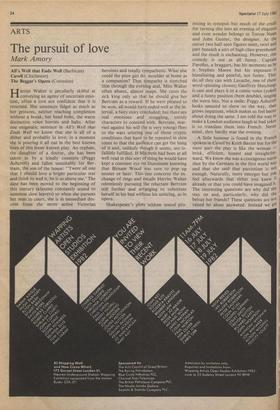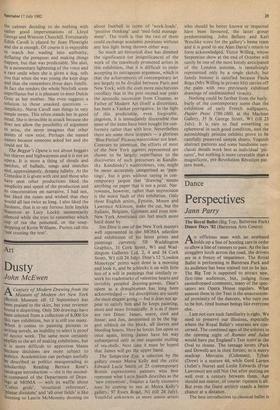ARTS
The pursuit of love
Mark Amory
The Beggar's Opera (Cottesloe) Harriet Walter is peculiarly skilful at conveying an agony of uncertain emo- tion, often a love not confident that it is returned. Her sentences fidget as much as her gestures, neither reaching completion without a break, her head bobs, the warm distinctive voice hurries and halts. After one enigmatic sentence in All's Well that Ends Well we know that she is all of a dither and probably in love; in a moment she is pouring it all out in the best known lines of this lesser known play. An orphan, the daughter of a doctor, she has been taken in by a kindly countess (Peggy Ashcroft) and fallen unsuitably for Ber- tram, the son of the house: "Twere all one that I should love a bright particular star and think to wed it, he is so above me.' The date has been moved to the beginning of this century (klaxons constantly sound to summon slow leavers) so when she pursues her man to court, she is in immediate des- cent from the more active Victorian
heroines and totally sympathetic. What else could the poor girl do, moulder at home as a companion? That sympathy is stretched thin through the evening and, Miss Walter often absent, almost snaps. She cures the sick king only so that he should give her Bertram as a reward. If he were pleased to be won, all would have ended well at the in- terval, a fairy story concluded; but there are real emotions and straggling, untidy characters to contend with. Bertram, mar- ried against his will (he is very young) flees to the wars uttering one of those cryptic conditions that have to be repeated in slow tones so that the audience can get the hang of it and, unlikely though it seems, are in- fallibly fulfilled. If Macbeth had been at all well read in this sort of thing he would have kept a constant eye on Dunsinane knowing that Birnam Wood was sure to pop up sooner or later. This one concerns the ex- change of rings and entails Harriet Walter relentlessly pursuing the reluctant Bertram still further and arranging to substitute herself in his bed without his noticing, as in opera.
Shakespeare's plots seldom sound pro-
miring in synopsis but much of the credit for turning this into an evening of elegance and even wonder belongs to Trevor Nunn and John Gunter, the designer. At the outset two half-seen figures meet, twirl and part beneath a sort of high-class greenhouse and the result is enchanting. However, this comedy is not at all funny. Captain Parolles, a braggart, has his moments as he is Stephen Moore but his exposure Is humiliating and painful, not funny. They do all they can with Lavache, one of those word-spinning clowns; Geoffrey Hutchings is cast and plays it in a comic voice (yokel) and a funny position (bent double), singing the worst bits. Not a smile. Peggy Ashcroft looks amused to show us the way, then grows impatient, which makes us feel better about doing the same. I am told the way to make a London audience laugh at bad jokes is to translate them into French. Never mind, they hardly mar the evening.
A little humour is found in -the French spoken in Cavell by Keith Baxter but for the most part the play is like the woman — brisk, efficient, honest and straightfor- ward. We know she was a courageous nurse shot by the Germans in the first world war and that she said that patriotism is not enough. Naturally, more emerges but you feel afterwards that either you knew already or that you could have imagined it. The interesting questions are why did she stay on and, particularly, why did she betray her friends? These questions are not raised let alone answered. Instead we gel the cabinet deciding to do nothing with rather good impersonations of Lloyd George and Winston Churchill. Fortunately Edith Cavell is played by Joan Plowright and she is enough. Of course it is enjoyable to watch her wading into authority, deflating the pompous and making things happen, but that was predictable. She also, by a momentary lightening of the voice and a rare smile when she is given a dog, tells You that when she was young she kept dogs and that she remembers those days fondly. In fact she renders the whole Norfolk scene superfluous but it is pleasant to meet Dulcie Gray as her mother. She even suggests a solution to those unasked questions simplicity. Nurse Cavell sees things in very simple terms. This often stands her in good stead. She is invincible in attack because she does not allow the possibility of argument to arise, she never imagines that other Points of view exist. Perhaps she named names because someone asked her and she could not lie..
The Beggar's Opera is not about beggars but thieves and highwaymen and it is not an Opera. It is more a thing of shreds and Patches, of ballads, songs and snatches and, approximately, dreamy lullaby. At the Cottesloe it is given with zest and those who have seen other productions liked the simplicity and speed of the production and its concentration on narrative. I had not, but liked the tunes and wished that they would all last twice as long. I also liked the business, that is to say furious little Imelda Staunton as Lucy Lockit momentarily silenced while she tries to remember which CLIP of tea she poisoned, or the soup- slopping of Kevin Williams. Purists call this `not trusting the text'.



































 Previous page
Previous page